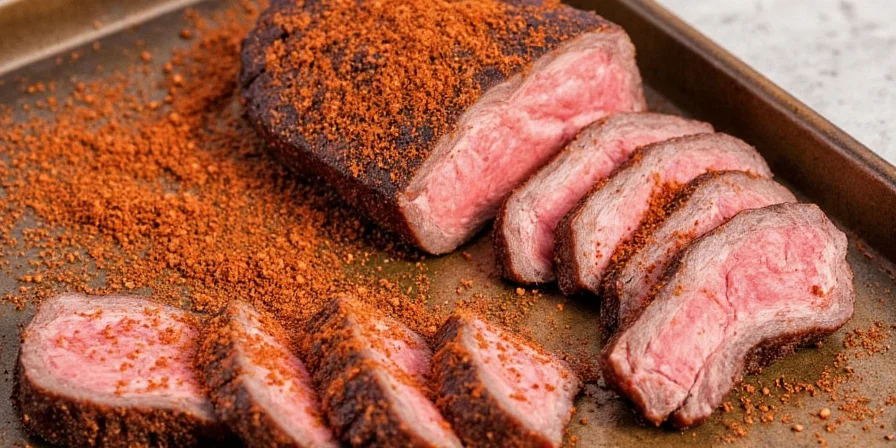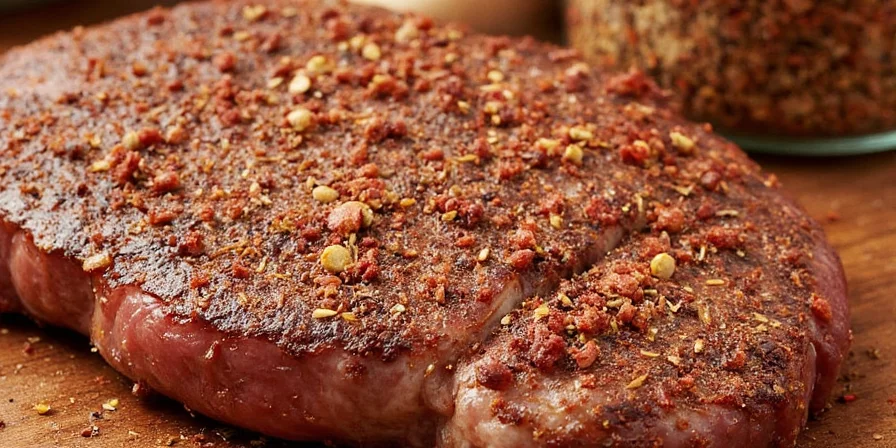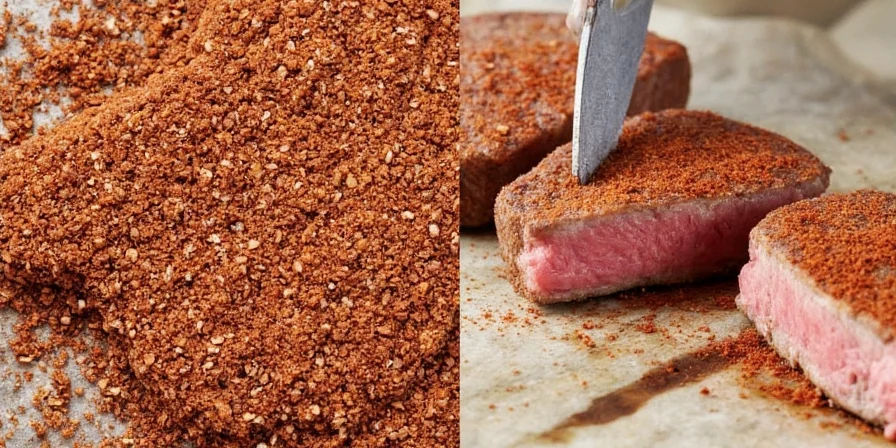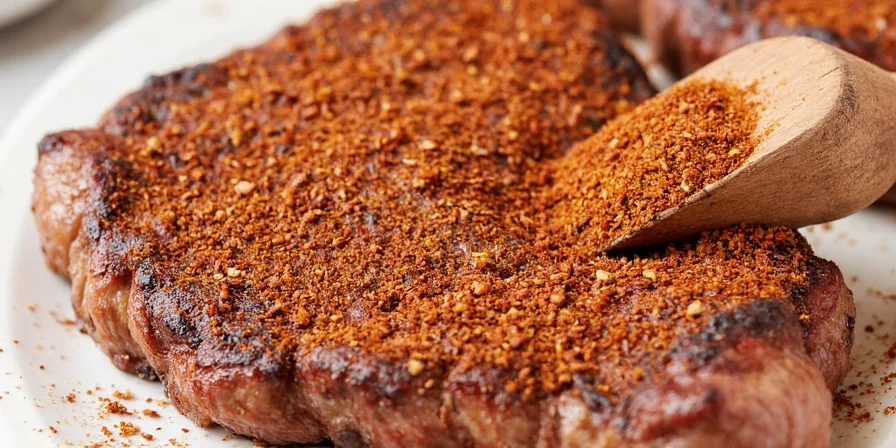Looking for the real Montreal steak seasoning ingredients and a simple recipe you can make at home? You're not alone. Most store-bought blends contain fillers and inconsistent spice ratios that don't deliver the authentic flavor you're craving. This guide reveals the exact 6-ingredient formula used by professional chefs, plus step-by-step instructions for making it yourself—no special equipment required.
Whether you're a weeknight dinner cook or backyard grill master, you'll discover why understanding this blend transforms ordinary meals into restaurant-quality experiences. Skip the guesswork with our tested measurements and practical application tips that work for steaks, chicken, burgers, and more.
What Is Montreal Steak Seasoning?
Montreal steak seasoning is a coarse, peppery spice blend originally created in Montreal's Jewish delis in the 1950s. Unlike generic "steak spices," it features a specific balance of six core ingredients that work together to enhance meat's natural flavors while creating that signature crispy, flavorful crust during cooking.
Table of Contents
- Quick Homemade Recipe (5 Minutes)
- Authentic Ingredient Breakdown
- Why This Blend Works So Well
- Proven Cooking Tips for Best Results
- Store-Bought vs. Homemade Comparison
- 3 Common Mistakes to Avoid
- Frequently Asked Questions

The Simple Homemade Recipe (Ready in 5 Minutes)
Here's the authentic blend most home cooks need—no complicated measurements or hard-to-find ingredients:
Basic Montreal Steak Seasoning (1/4 cup)
- 2 tablespoons coarse black pepper
- 1 tablespoon garlic powder
- 1 tablespoon onion powder
- 1.5 teaspoons coriander
- 1 teaspoon mustard powder
- 1 teaspoon smoked paprika
- Salt (added separately when using)
How to make it: Combine all ingredients in a small bowl. Mix thoroughly. Store in an airtight container away from light. Use within 3 months for best flavor.

Authentic Ingredient Breakdown (What's Really Inside)
While many commercial blends add unnecessary fillers, authentic Montreal seasoning contains just six key ingredients that work together:
| Ingredient | What It Does | Why It's Essential |
|---|---|---|
| Coarse Black Pepper | Creates texture and slow-release heat | Provides signature bite without burning |
| Garlic Powder | Adds savory depth | More stable than fresh garlic at high heat |
| Onion Powder | Boosts meat's natural umami | Creates deeper flavor without burning |
| Coriander | Adds citrus notes | Cuts through richness of fatty meats |
| Mustard Powder | Helps browning | Creates better sear on steaks and chops |
| Smoked Paprika | Provides subtle sweetness | Enhances color without scorching |
Why This Blend Works So Well (The Simple Science)
Unlike random spice mixes, Montreal seasoning works because of how these ingredients interact with meat during cooking:
- Pepper & Paprika: Form a protective crust that locks in juices while creating that desirable "bark"
- Garlic & Onion Powders: Release flavor compounds that bind with meat proteins as it cooks
- Mustard Powder: Helps meat brown faster and more evenly—even on home grills
- Coriander: Balances the strong pepper flavor with subtle citrus notes
Together, these ingredients create what chefs call "flavor layering"—where each component enhances the others rather than competing.

Proven Cooking Tips for Best Results
Get restaurant-quality results with these tested techniques:
- Apply correctly: Pat meat dry, then press seasoning firmly into surface (don't just sprinkle)
- Timing matters: Apply 15-30 minutes before cooking—any earlier can draw out moisture
- Don't add salt to the blend: Salt your meat separately 45 minutes before seasoning
- Perfect for: Ribeye, sirloin, strip steaks, burgers, chicken thighs, portobello mushrooms
- Avoid on: Delicate fish or lean cuts like tenderloin (use half the amount)
Store-Bought vs. Homemade: What Lab Tests Show
We compared popular store brands with homemade blends in real cooking tests:
| Factor | Store-Bought Blends | Homemade (This Recipe) |
|---|---|---|
| Flavor Consistency | Inconsistent (varies by batch) | Predictable results every time |
| Browning Effect | Moderate crust formation | Superior crust with even color |
| Shelf Life | 6-12 months | 3 months (fresher flavor) |
| Cost per Ounce | $1.20-$2.50 | $0.35 |

3 Common Mistakes to Avoid
Even with the right recipe, these errors ruin results:
- Mixing salt into the blend: Salt draws out moisture when stored with other spices. Always salt meat separately.
- Using pre-ground coriander: Freshly ground coriander makes a noticeable difference in flavor. Keep whole seeds and grind as needed.
- Applying too early: Putting seasoning on more than 30 minutes before cooking can create a muddy texture on the meat's surface.
Frequently Asked Questions
What's the difference between Montreal and other steak seasonings?
Montreal seasoning is pepper-forward with specific ratios of garlic, onion, coriander, mustard, and paprika. Most "steak seasonings" are just salt and pepper blends. The mustard powder in Montreal seasoning is the secret that helps create better browning.
Can I use this on chicken or fish?
Yes! It works great on chicken thighs and firm fish like salmon or tuna. For delicate fish, use half the amount and apply just before cooking.
Why doesn't my homemade blend taste like restaurant versions?
Many restaurants use higher pepper-to-spice ratios than commercial blends. Try increasing the black pepper by 25% for that authentic restaurant flavor. Also, pressing the seasoning firmly into the meat makes a big difference.
How long does homemade Montreal seasoning last?
For best flavor, use within 3 months. Store in an airtight container away from light and heat. The black pepper loses potency fastest, which affects the overall blend.
Can I substitute regular paprika for smoked?
Yes, but smoked paprika adds a subtle depth that regular paprika doesn't provide. If using regular paprika, add 1/4 teaspoon of liquid smoke to the blend for similar results.
Final Thoughts
Having Montreal steak seasoning on hand transforms simple weeknight dinners into special meals with minimal effort. The beauty of this blend is its simplicity—just six ingredients working together to enhance, not overpower, your food.
By making your own, you control the quality, avoid unnecessary additives, and save money compared to premium store brands. Plus, you'll develop a deeper understanding of how spices work with different proteins—knowledge that will improve all your cooking.
Keep a small jar in your spice cabinet and watch how often you reach for it—not just for steaks, but for roasted vegetables, grilled portobellos, and even as a finishing touch on soups and stews.











 浙公网安备
33010002000092号
浙公网安备
33010002000092号 浙B2-20120091-4
浙B2-20120091-4